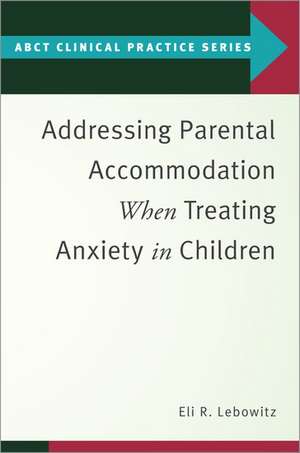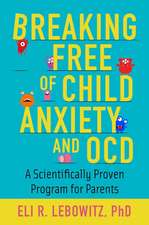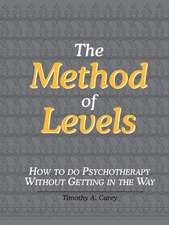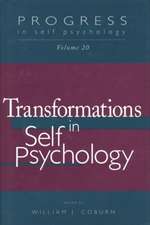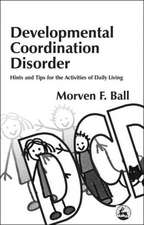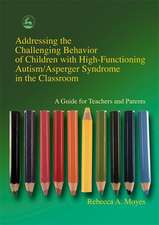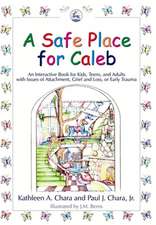Addressing Parental Accommodation When Treating Anxiety In Children: ABCT Clinical Practice Series
Autor Eli R. Lebowitzen Limba Engleză Paperback – 3 oct 2019
Preț: 361.65 lei
Preț vechi: 380.69 lei
-5% Nou
Puncte Express: 542
Preț estimativ în valută:
69.21€ • 71.99$ • 57.14£
69.21€ • 71.99$ • 57.14£
Carte disponibilă
Livrare economică 24 martie-07 aprilie
Livrare express 08-14 martie pentru 25.62 lei
Preluare comenzi: 021 569.72.76
Specificații
ISBN-13: 9780190869984
ISBN-10: 0190869984
Pagini: 184
Dimensiuni: 155 x 231 x 13 mm
Greutate: 0.27 kg
Editura: Oxford University Press
Colecția OUP USA
Seria ABCT Clinical Practice Series
Locul publicării:New York, United States
ISBN-10: 0190869984
Pagini: 184
Dimensiuni: 155 x 231 x 13 mm
Greutate: 0.27 kg
Editura: Oxford University Press
Colecția OUP USA
Seria ABCT Clinical Practice Series
Locul publicării:New York, United States
Recenzii
For clinicians treating children who have anxiety, this trendsetting book offers guidelines, illustrative dialogues, and vignettes to support addressing parents' accommodation behaviors and children's anxiety interactively.
It's all about accommodation, and Lebowitz does an impressive job describing (a) accommodation and all its feature and (b) the application of strategies designed to reduce parent accommodation. Unburdened by excessive citations, yet rich with case descriptions, this well-informed and readable work recognizes that prior parent interventions for child anxiety were typically added-on to child treatment, rather than being an independent stand-alone approach. Lebowitz provides an excellent resource for those wanting to learn about changing parent accommodation to favorably impact child anxiety and OCD.
Eli Lebowitz scores big with this innovative, highly readable, and practical guide for therapists who work with anxious children and their families. Unlike many standard child-focused treatments for anxious children, this approach is oriented towards working primarily with and through parents who inadvertently or otherwise accommodate the very fears and anxieties they wish to change in their children. This is not to say the parents cause the fear and anxiety; rather, and most importantly, it acknowledges the role that parents play in accommodating and perhaps maintaining these fears and anxieties... Here, Lebowitz presents us with a developmentally-sensitive, contextually-informed, and evidence-based approach which will help us address the weaknesses in our extant approaches. It is a volume whose time has surely come.
It's all about accommodation, and Lebowitz does an impressive job describing (a) accommodation and all its feature and (b) the application of strategies designed to reduce parent accommodation. Unburdened by excessive citations, yet rich with case descriptions, this well-informed and readable work recognizes that prior parent interventions for child anxiety were typically added-on to child treatment, rather than being an independent stand-alone approach. Lebowitz provides an excellent resource for those wanting to learn about changing parent accommodation to favorably impact child anxiety and OCD.
Eli Lebowitz scores big with this innovative, highly readable, and practical guide for therapists who work with anxious children and their families. Unlike many standard child-focused treatments for anxious children, this approach is oriented towards working primarily with and through parents who inadvertently or otherwise accommodate the very fears and anxieties they wish to change in their children. This is not to say the parents cause the fear and anxiety; rather, and most importantly, it acknowledges the role that parents play in accommodating and perhaps maintaining these fears and anxieties... Here, Lebowitz presents us with a developmentally-sensitive, contextually-informed, and evidence-based approach which will help us address the weaknesses in our extant approaches. It is a volume whose time has surely come.
Notă biografică
Eli R. Lebowitz, PhD, studies and treats childhood and adolescent anxiety at the Yale School of Medicine, Child Study Center, where he is director of the Program for Anxiety Disorders. His research focuses on the development, neurobiology, and treatment of anxiety and related disorders, with special emphasis on family dynamics and the role of parents in these disorders.
